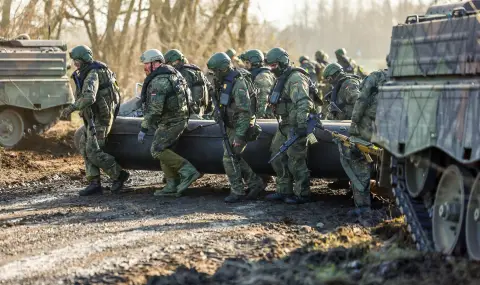The former training center at the barracks in Birkenfeld, Rhineland-Palatinate, is overgrown with moss - the last soldiers left the area eight years ago. The 2nd Airborne Division was previously based there, which was disbanded in 2013. The facilities have been dismantled, and now an industrial park with office buildings and housing is to be built on the site. There is no going back, writes the German public media ARD.
As part of the reforms in the Bundeswehr and the abolition of compulsory military service, 31 barracks have been closed in Germany since 2011, and other units have been reduced in size. Some of the former barracks are used as dormitories for refugees. There are currently 275 Bundeswehr bases in Germany, compared to 400 previously, ARD reports.
Mold and urgent need for renovation
Many of the Bundeswehr bases are in a "wretched state" and urgently need to be renovated, notes the Bundestag's representative for the state of the army, Eva Högl. She noted that many buildings, especially training and sleeping quarters, are in extremely poor condition: mold, leaks, crumbling plaster. The renovation of one of the barracks in Germersheim, Rhineland-Palatinate, alone will cost more than 125 million euros. And the work could not be completed until after 2030 at the earliest.
The administrations in the respective provinces, which are often very overloaded, are primarily responsible for carrying out construction work, according to Eva Högl's report. The Bundeswehr bases are located on around 1,500 properties throughout Germany, and the total number of buildings is over 35,000.
Another reason for the poor condition of many of the bases is the fact that it was first decided to close them, then the decisions were reversed. In addition, there has been no investment or renovation, ARD further reports.
Experts: Bureaucracy paralyzes change
"What is available is mostly in poor condition," confirms Joachim Weber from the University of Bonn, a security expert. The main problem is often the usual German bureaucracy: rules and requirements paralyze the necessary processes. The current global situation demands anything but a waste of time.
A year after Federal Defense Minister Boris Pistorius presented his plans for restructuring the Bundeswehr, the situation remains dire. One of the minister's goals was to increase the number of soldiers to at least 203,000 by 2031. However, given that the Bundeswehr has had around 181,000 soldiers for about ten years, this goal is unlikely to be achieved anytime soon. According to the report by the Bundestag's plenipotentiary for the state of the army, the personnel situation remains "worrying". According to the Union of Reservists, there is a shortage of 20,000 soldiers this year alone, ARD reports.
"Where will all these people come from?"
Security expert Joachim Weber doubts that a significant increase in the Bundeswehr could function on the basis of the current system. He therefore advocates "some form of return to compulsory military service". According to Weber, the voluntary military service model is not working - despite great efforts, the Bundeswehr is not able to recruit enough recruits. The number of conscripts who prematurely terminate their contracts and leave the army also remains high.
"If it has been impossible to attract tens of thousands of people to the barracks in the last three years, where could they come from in the future?", asks Weber, quoted by ARD.
The debate on the return of compulsory military service has meanwhile flared up again. For now, the coalition agreement of the new ruling parties - conservatives and social democrats - excludes compulsory military service, but the topic is not closed, the German media notes.
A Herculean task
If it does come to that at some later point, the Bundeswehr will be faced with a Herculean task, believes Joachim Weber. The reason: the entire system that would be needed has been dismantled in the meantime: from military registration to administration to housing such a large number of people in the barracks. There is also a lack of instructors to train the new recruits. In other words: it will take a lot of time and a lot of money to rebuild the system.
Author: Oliver Bemelmann (ARD)
